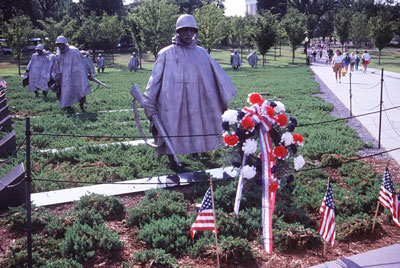Sixty years ago today, the armistice was signed to end the brutal three-year war that had devastated the Korean Peninsula.
North Korea’s invasion in June 1950 made all too clear the true nature of the regime — its willingness to blatantly violate international agreements, its eagerness to use military attacks to achieve political objectives, and its utter disregard for the lives of Korean citizens.
Leaders and citizens of the United States and the Republic of Korea rightly pay homage to the brave men and women of our armed forces for their defense of Korea and perseverance at times when it must have seemed that even hope had died. We humbly honor their service and remember that far too many brave young souls paid the ultimate sacrifice to protect our shared values of freedom, democracy, and human rights.
That tragic conflict has been referred to as “The Forgotten War.” It is an unfitting label since it will never be forgotten by the people of the Republic of Korea. Nor will that shared ordeal ever be forgotten by those Americans who treasure freedom and the willingness to bravely and resolutely fight for it against even seemingly insurmountable odds.
During her May 2013 trip to Washington, President Park Geun-hye visited the Korean War Memorial. There she expressed on behalf of her nation “our profound gratitude to America’s veterans. Their blood, sweat and tears helped safeguard freedom and democracy.”
President Park commented how moved she was by the words etched in granite at the memorial: “Our nation honors her sons and daughters who answered the call to defend a country they never knew and a people they never met.” At a dinner celebrating the alliance, Park honored U.S. veterans, speaking eloquently of how “freedom is not free … peace is not free.”
It has been said that the U.S.–Korean alliance has been “forged in blood.” That is surely true, because the true mettle of an enduring alliance — of a partnership, of a friendship — such as that between our two countries, can only come when we have shared not only the best of times, but also of the worst of times.
The U.S. and South Korea stood together during that ordeal and in the subsequent 60 years. This alliance forged in blood has been tempered by repeated crisis. The events of June 1950 are not merely a distant historical event.
As Pyongyang’s heinous attacks on the South Korean naval ship Cheonan and Yeonpyeong Island in 2010 — and all of its other acts of terror and aggression over the years — make all too clear, the need for vigilance has not diminished. Every day, the Korean Peninsula remains in the shadow of conflict and always on the knife edge of crisis.
